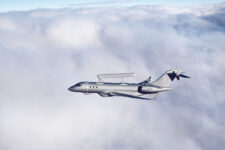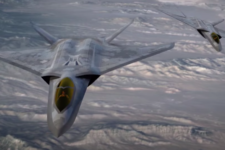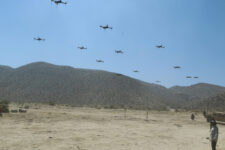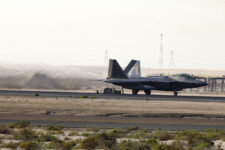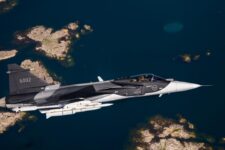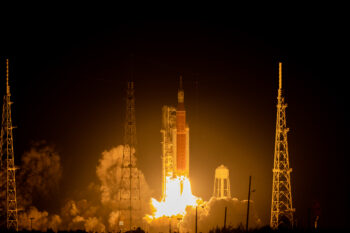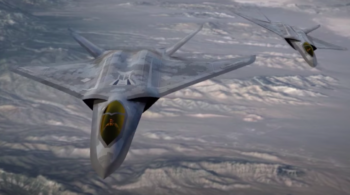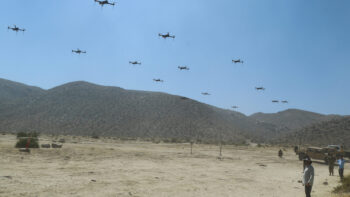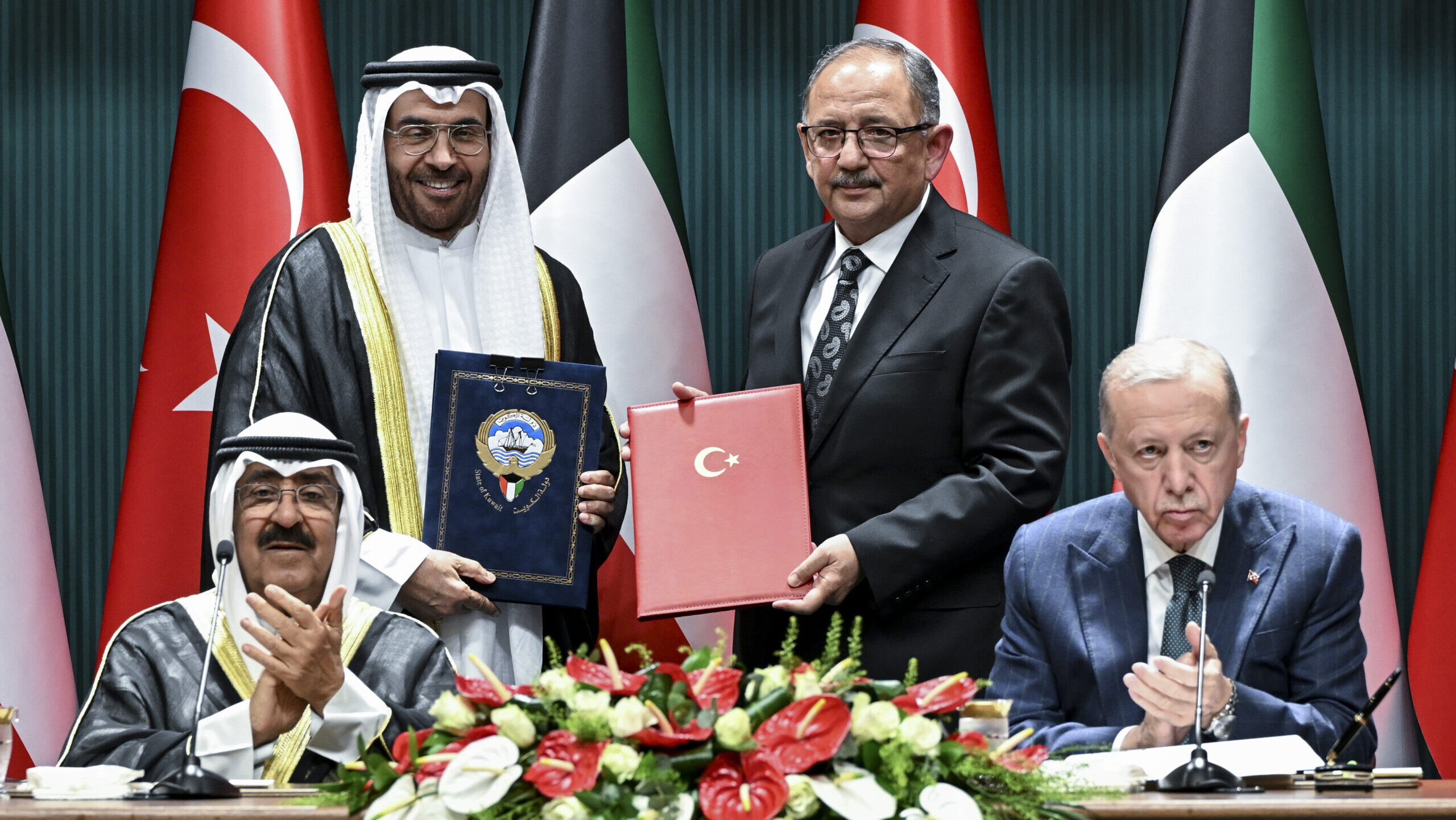
Turkish President Recep Tayyip Erdogan (R) meets with Emir of Kuwait, Mishal Al-Ahmad Al-Jaber Al-Sabah (L) at the Presidential Complex in Ankara, Turkiye on May 07, 2024. (Photo by Utku Ucrak/Anadolu via Getty Images)
BEIRUT — A new defense cooperation agreement between Kuwait and Turkey is expected to help the small Gulf monarchy better equip and train its armed forces, while giving Ankara another foothold in the lucrative Gulf market, experts told Breaking Defense.
Last week Kuwaiti Emir Shiekh Meshal Al-Ahmed Al-Jaber Al-Sabah met with Turkish President Recep Tayyip Erdogan, where the two leaders oversaw the signing of several agreements, including one described as an “executive protocol” between the countries’ defense ministries related to government defense industry purchases, according to Kuwaiti state media.
“We affirm our aspiration for strengthening joint cooperation in all fields, especially in the defense domain through government-to-government contracting,” Sheikh Meshal said, according to a translation by Arab News.
Kuveyt Devlet Emiri Şeyh Mişal El Ahmed El Cabir El Sabah'ı Resmî Karşılama Töreni https://t.co/2CnOUoQ0Uc
— Recep Tayyip Erdoğan (@RTErdogan) May 7, 2024
While neither side provided details about this contracting protocol, experts said that it appears Kuwait is eager for direct access to Turkish defense systems, as all Middle East nations eye strengthening their capabilities amid regional conflicts.
“The Kuwaiti emphasis on ‘defense to defense’ contracts is intended to convey the transparency, directness, and effectiveness of their defense deals with Turkey, without the involvement of any intermediaries that could potentially lead to corruption,” Ali Bakir, professor at Qatar University and non-resident senior fellow at the Atlantic Council’s Scowcroft Middle East Security Initiative, told Breaking Defense. “While Kuwait and Turkey signed a comprehensive joint defense pact in late 2018, underscoring their shared commitment to mutual security interests, Kuwait remains the least active among the Gulf Cooperation Council (GCC) countries in terms of defense procurement from Turkey.”
In 2023, Kuwait has contracted the now-popular Turkish Bayraktar TB2 — made famous in Ukraine — in a contract worth $367 million. This new agreement, Bakir said, “serves to build upon this existing cooperation and paves the way for Kuwait to further enhance its defense and security relations with Ankara.”
Turkey, meanwhile, has seen a jump in defense exports amid simultaneous crises in Europe and the Middle East.
“As the Kuwaitis work to modernize their military, Ankara eyes the lion’s share of Kuwait’s defense procurements,” Bakir said. “Turkey is willing to offer a range of its modern, cost-effective and highly capable weapons as well as establishing a military base in Kuwait should the Gulf nation express a desire for such a move.”
Retired Kuwaiti colonel and defense analyst Zafer Al Ajami added that beyond the TB-2, Kuwaiti leaders are especially keen for drones and counter drones capabilities from the Turkish industry. “Kuwait is a good country in a bad neighborhood, and even if threats are not imminent, strengthening [defense capabilities] is important.”
Beyond hardware, he predicted that the executive protocol could boost Kuwait’s training programs as well.
“I expect the protocol to facilitate training programs between Kuwait and Turkey. Kuwait will undoubtedly benefit from it, as Turkey has experience in many fields, especially combating terrorism,” he said.
Al Ajami did draw the line, however, at talk of a Turkish base hosted by the Gulf monarchy.
“Turkey is marketing itself as a soft defense provider in the first place and then as a hard defense provider, but I do not think that we need a Turkish base in Kuwait for many reasons, the most important of which is that the Turks do not have long-range deployment capabilities like UK and US, and which Kuwait needs,” he told Breaking Defense.
The newly signed executive protocol comes after Ankara has normalized ties with Saudi Arabia and the United Arab Emirates, and has started to strengthen the defense ties with them, paving the way for further Gulf engagement.
“The normalization of Saudi Arabia and the UAE with Turkey has further facilitated the defense cooperation between Kuwait and Anakra. This emerging defense and security partnership reflects Kuwait’s efforts to diversify its security arrangements,” Bakir said.
In his opinion, Can Kasapoglu, a Turkish defense expert and senior fellow at the Hudson Institute, told Breaking Defense that signing this protocol “signifies Ankara’s acknowledgement of Kuwait’s regional security concerns and is a more practical follow up on the 2019 Turkish-Kuwait defence plan that builds on the mutual exchange of military experience and technical know how.”
Unlike other Gulf countries like the UAE, Saudi Arabia and Qatar, Kuwait didn’t embark on local defense production with national firms, and hence procuring arms is still the only way to defense its territory and assets.
“Deepening its bilateral ties and expanding its military presence with the MENA/Gulf market also helps Ankara to diversify its regional partnerships and expand its defense exports. This is particularly important given the rise of the Iran threat in the Middle East. Turkiye is the only NATO nation in the town,” Can said.
Hegseth fires Navy’s top officer, Air Force No. 2
The firings of Adm. Lisa Franchetti and Gen. James Slife follows tonight’s removal of Gen. CQ Brown as chairman of the Joint Chiefs of Staff.



